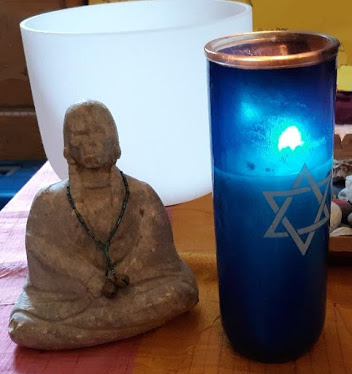Earth Etude for Elul 14: Finding My Authentic Self
by Thea Iberall
I’m sure everyone’s going to write one of these. How hard life has become under a syndemic at the confluence of a fatal pandemic and a raging climate crisis, all of which has exposed centuries-long racial injustices and social disparities. Over 700,000 deaths have occurred due to Covid-19. The climate crisis is causing 150,000 deaths a year. Over 120,000 square kilometers of tropical rainforests are being lost every year. Wildlife populations have dropped by 60%. A majority of victims of police harm are people of color. One in every three black boys in America can expect to go to jail. The daily news reports leave me unable to concentrate. I don’t know how to plan, I’m afraid of doing anything outside—or even to be with people. Going to my grandson’s baseball game could cause my death.
The year 2020 was going to be a big year for me. I had huge expectations, as did millions of other women around the country. This is the 100th anniversary of the ratification of the 19th Amendment to the US Constitution, giving women the right to vote. Celebration plans were in the works for years—for a decade or longer—by organizations from all over the country,: marches, festivals, rallies, performances, readings, plays, films. My performing troupe expected to do dozens of shows. We had charts, letters of agreement, contracts, Excel spreadsheets. Everything has had to be cancelled, postponed, or put online. It’s been painful watching the year 2020 dissolve into protective masks, social distancing, and staring at computer screens.
But that’s the thing about expectation. When I make plans, I expect to carry them out. And if they fall through, I get disappointed. Expectations are about living in the future. Disappointment is pain in the present. It’s not fun. But how can I plan for the future and avoid the pain of disappointment?
There is another word like expectations: that word is ‘expectancy.’ While expectations prevent us from living in the moment and can lead to disappointment, expectancy involves living with intentionality in a flexible way. It’s about embracing change, looking for the positive. In this month of Elul, a time for returning to God, teshuvah, before the high holidays, it is a good time to turn our expectations into expectancy. This is the hallmark of a spiritual practice.
My wife started a new spiritual practice: a daily online meditation group. Every morning, for the last 140 days, she shares a reading with the group and we all meditate on that and then we share our reflections. We have found this practice is a way to explore our authenticity. As we live on the edge of death in this unbearable syndemic, we think about hard-learned truths and share from our most deepest hearts.

The year 2020 has turned into a year of connecting on a very deep level, a year when I can go to events I never dreamed possible, a year where people from all over the world can experience my performing troupe. And I am getting more done on all sorts of backburner projects. But what I cannot forget is to keep my focus on teshuvah, the expectancy of a spiritual connection.
We’ll be living these new lives for a long time.
Thea Iberall, PhD, is on the leadership team of the Jewish Climate Action Network-MA. Iberall is the author of The Swallow and the Nightingale, a visionary fiction novel about a 4,000-year-old secret brought through time by the birds. In this fable, she addresses the real moral issue of today: not whom you love, but what we are doing to the planet. Iberall is also the playwright of We Did It For You! Women’s Journey Through History – a musical about how women got their rights in America, told by the women who were there. She was inducted into the International Educators Hall of Fame for creative teaching methods. In her work, she bridges between heart and mind and teaches through performance, the written word, poetry, sermons, workshops, and storytelling. www.theaiberall.com.

Got something to say?
You must be logged in to post a comment.